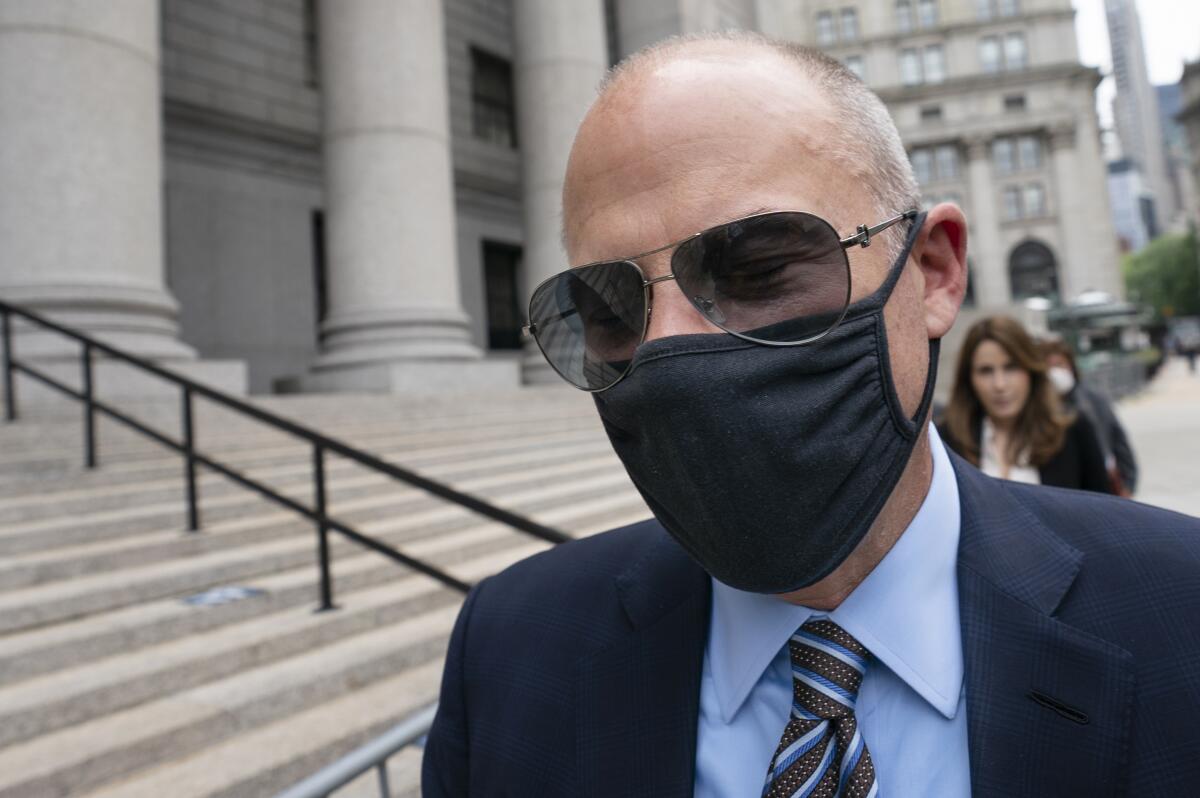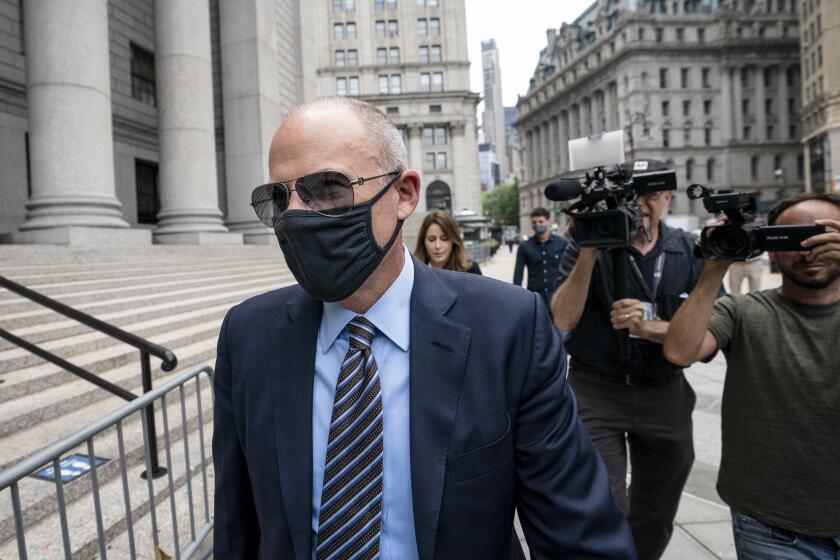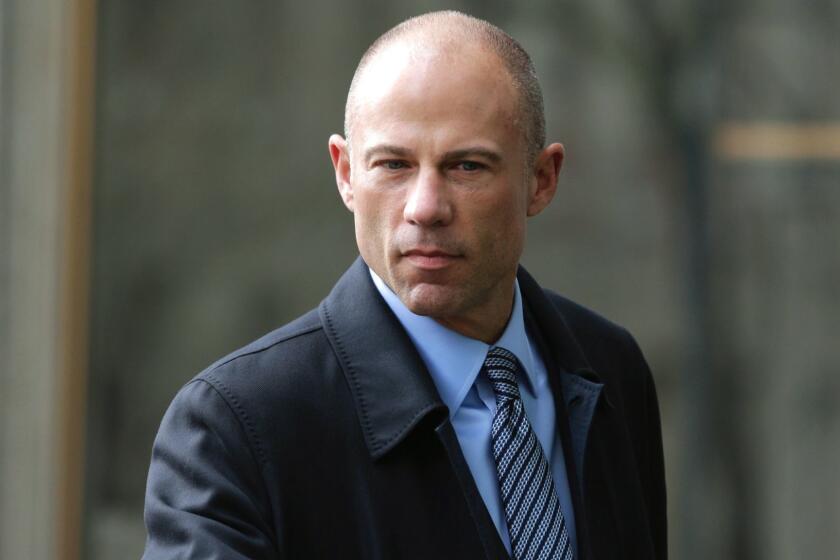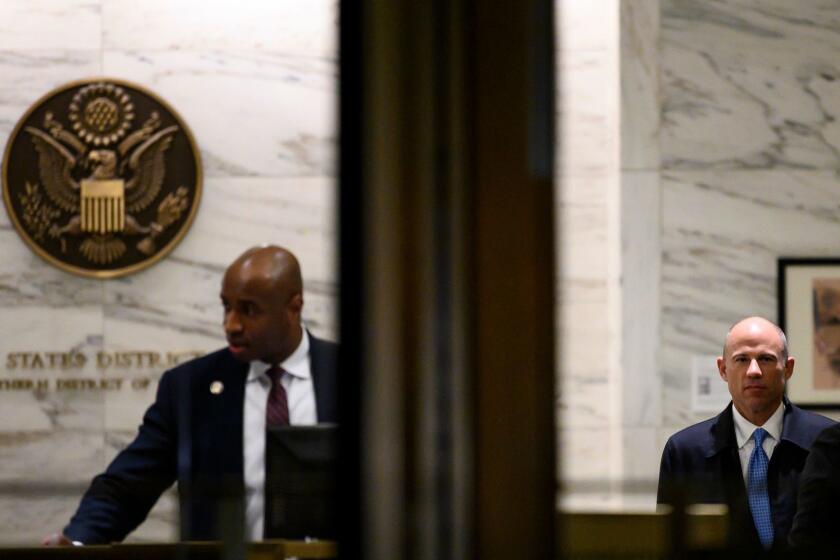Judge declares mistrial in Michael Avenatti embezzlement case

A federal judge in Orange County declared a mistrial Tuesday in an embezzlement case against lawyer Michael Avenatti, saying prosecutors failed to provide him with documents he needed to defend himself against charges that he stole millions of dollars from clients.
After bringing an abrupt end to the proceedings, U.S. District Judge James V. Selna set a new trial date of Oct. 12.
The mistrial was a significant, if fleeting, victory for Avenatti, who is best known as the former lawyer for Stormy Daniels, the adult film actress who was paid by President Trump to keep quiet about an alleged extramarital affair.
Avenatti must still report to federal prison on Sept. 15 to start serving a 30-month sentence following his July conviction in New York for attempting to extort as much as $25 million from the Nike footwear company.
And after his retrial, Avenatti will face two more federal criminal trials: one in Santa Ana on charges that include bank fraud and failure to file tax returns, and one in New York on charges of skimming money from Danielsâ deal to write a book detailing her entanglement with Trump.
In the aborted California trial, Avenatti was charged with 10 counts of wire fraud. Prosecutors say he stole nearly $10 million from his clients in four legal settlements and concocted elaborate deceptions to hide the theft.
Avenattiâs law license is suspended while the state seeks to disbar him, but he nonetheless has been representing himself.
In the five weeks since the trial opened, he has argued that prosecutors failed to take into account the expenses he incurred while working for the clients whose money he is accused of embezzling. The issue came to a head Aug. 15, when Avenatti made his sixth request for a mistrial.
On Friday, Selna ordered prosecutors to work through the weekend to recover expense data that Avenatti said the government had improperly withheld from him.
At a hearing Tuesday in Santa Ana, Selna agreed that prosecutorsâ failure to give Avenatti the expense data had violated their obligation to disclose all evidence that might be favorable to the defendant. The remedy, he ruled, was to start the trial over with a new jury.
Former L.A. lawyer for porn actress Stormy Daniels is now a convicted felon representing himself at the second of his four criminal trials
âThis was obviously important stuff that they knew about and didnât turn over,â said H. Dean Steward, Avenattiâs advisory counsel.
In trying to persuade Selna to let the trial continue, prosecutors minimized the importance of the expenses. The fraud charges, they argued, were based on lies Avenatti allegedly told his clients to cover up his theft, regardless of the specific amount.
Thom Mrozek, a spokesman for the U.S. attorneyâs office in Los Angeles, declined to comment.
The governmentâs trouble stemmed from its 2019 seizure of computer servers from Avenattiâs defunct Newport Beach law firm, Eagan Avenatti.
To prevent the prosecutors who would be trying the case from seeing the firmâs confidential attorney-client records, the Justice Department had a âtaint teamâ review the servers. The team was supposed to pass along all data prosecutors could properly use for the case â including expense records that also had to be turned over to Avenatti as potentially exculpatory evidence.
But the judge found that the team failed to search for all the expense records, according to Steward.
It was a costly oversight. In his opening statement at the trial, Avenatti told jurors that his law firmâs expenses would be essential to establishing his innocence. The legal settlements that he won required enormous costs for travel, the hiring of experts, the purchase of testimony transcripts and many other expenses, he argued.
Avenatti also told jurors of the high-risk nature of the business for plaintiffsâ attorneys, saying they are paid on contingency, earning a specific cut of whatever judgment or settlement they win.
âLadies and gentlemen, the evidence will show that when you litigate cases of this complexity, of this magnitude, of this duration, in order to stay in the game, keep the case going, give your client a fighting chance, you have to spend money,â he said.
Michael Avenatti was caught in a downward spiral of financial trouble last year when Jerry Tobin, an unlikely savior, came to the rescue.
In court papers, Avenatti said his initial review of expense data provided to him Monday by Assistant U.S. Atty. Patrick Fitzgerald, the leader of the taint team, uncovered more than 1,800 documents that prosecutors had failed to disclose. They showed 111 financial transactions reflecting money paid by the firm to clients whose money he allegedly stole, he said.
None of that money was counted in the charts prosecutors put into evidence during testimony of their financial expert, John Drum, Avenatti claimed. It was disturbing, Avenatti wrote, that the government âdid nothingâ to locate and produce such documents before the trial, even though Judy Regnier, his firmâs chief administrator, told investigators in 2019 about the expense tracking system.
Avenatti argued that prosecutorsâ âsuppression of the informationâ prevented him from highlighting the data in his opening statement; using it to challenge the credibility of his clients, Drum, Regnier and a government investigator; attacking the governmentâs âegregious failureâ to search the firmâs servers for the expense records; and developing a trial strategy around them.
Long before he was Stormy Danielsâ lawyer, well before he was accused of trying to shake down Nike for millions of dollars, Michael Avenatti was an Orange County plaintiffâs attorney living a luxe life adorned with fast cars, high-end properties and expensive jewelry.
Still, testimony at the trial so far suggests that there are limits to what Avenatti can do with the expense data. A key witness, Michelle Phan, a makeup artist with 8.8 million YouTube followers, testified that Avenatti failed to pay her the final $4 million of a 2017 legal settlement he negotiated as her attorney.
âI hired him to protect me, and the idea and the fact that he took my money like that, it was almost hard to swallow, but when the reality hit me, I was just â I was utterly shattered,â Phan testified.
Assistant U.S. Atty. Brett Sagel asked Phan whether she knew that Avenatti used much of the money to pay back taxes owed by his law firm. She said she did not.
In his cross-examination, Avenatti focused at length on his friendly text messages with Phan in the weeks following his receipt of the $4 million but not on whether he was somehow entitled to spend it rather than give it to Phan.
âMs. Phan, did you ever create a video on April 12, 2018, in which you blew me a kiss and said, âMichael, thank you,â with a heart emoji? Yes or no?â Avenatti asked. Phan recalled that she did make the video.
More to Read
Sign up for Essential California
The most important California stories and recommendations in your inbox every morning.
You may occasionally receive promotional content from the Los Angeles Times.














